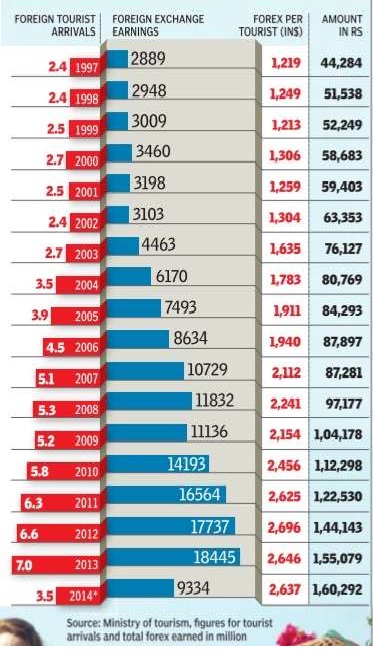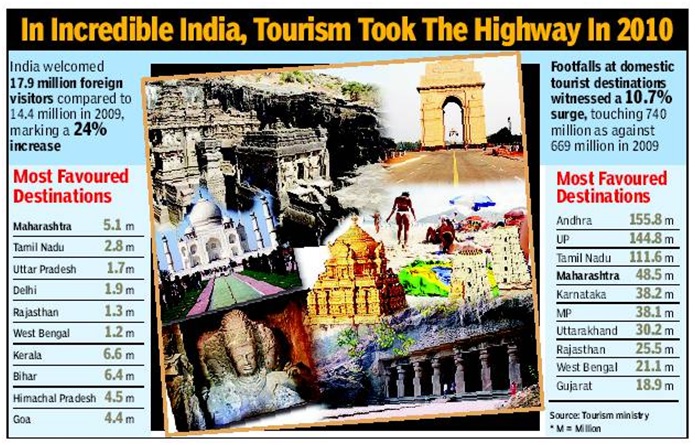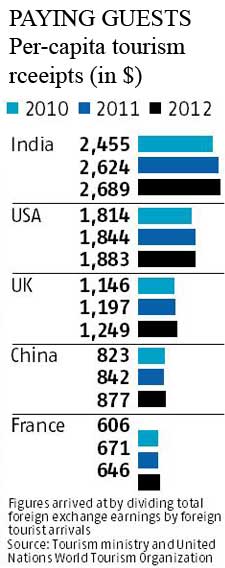Tourism: India (foreign tourists)
(→Travel and Tourism Competitiveness Index) |
(→2017: India rises 12 ranks to 40) |
||
| Line 142: | Line 142: | ||
[http://epaperbeta.timesofindia.com/Article.aspx?eid=31808&articlexml=INDIA-DIGEST-20052017011046 India rises in UN's tourism rankings, May 19, 2017: The Times of India] | [http://epaperbeta.timesofindia.com/Article.aspx?eid=31808&articlexml=INDIA-DIGEST-20052017011046 India rises in UN's tourism rankings, May 19, 2017: The Times of India] | ||
| − | |||
India is among the 15 most-improved countries on the global index and has moved up 12 notches from 52 in 2015 to 40 in 2017.Spain remains on top of the index, while Yemen brings up the rear ranked 136. | India is among the 15 most-improved countries on the global index and has moved up 12 notches from 52 in 2015 to 40 in 2017.Spain remains on top of the index, while Yemen brings up the rear ranked 136. | ||
Revision as of 20:07, 27 June 2017
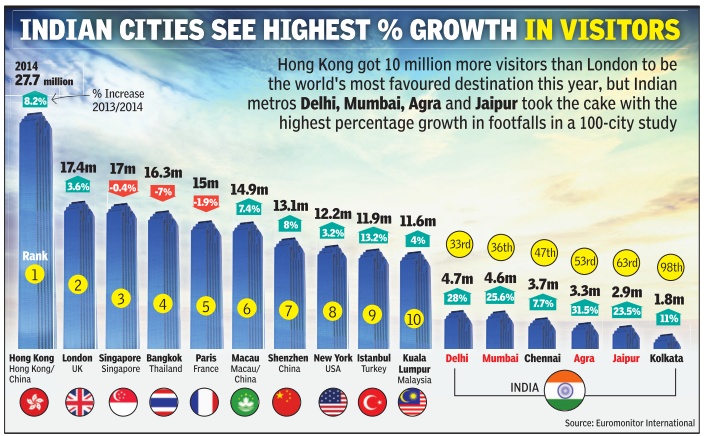
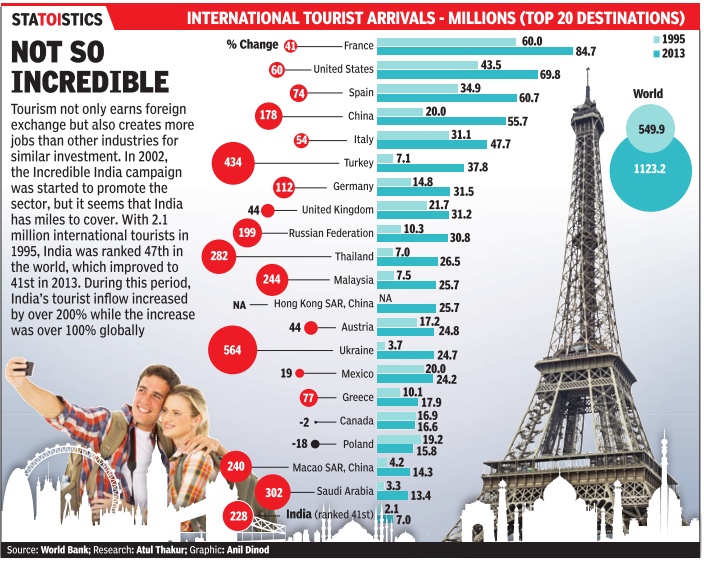
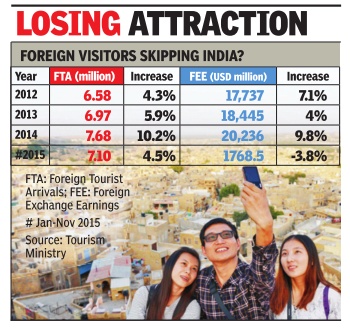
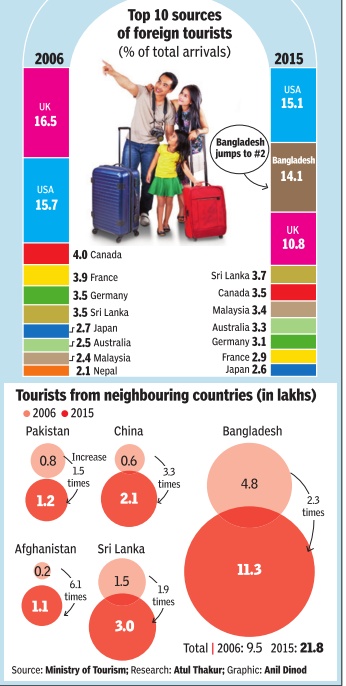
This is a collection of articles archived for the excellence of their content. Readers will be able to edit existing articles and post new articles directly |
Contents |
Number of international tourists
1995 to 2014
INDIA SECOND FASTEST GROWING TOURIST DESTINATION , Sep 28 2016 : The Times of India
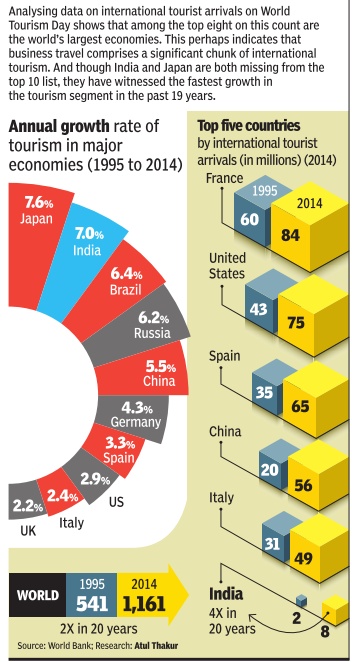
ii) Tourist arrivals in India, China and other major countries in 2014.
The Times of India
Analysing data on international tourist arrivals on World Tourism Day shows that among the top eight on this count are the world's largest economies. This perhaps indicates that business travel comprises a significant chunk of international tourism. And though India and Japan are both missing from the top 10 list, they have witnessed the fastest growth in the tourism segment in the past 19 years.
See graphic.
1997-2014
The Times of India Jan 16 2015
There has been a steady increase in the arrival of foreign tourists in India. In 2013, India was visited by 7 million foreigners, roughly three times the number in 1997. Over this period, foreign exchange earnings from tourism increased by more than six times. What the data shows is that in 1997, the average earning for India per foreign tourist was a little over Rs 44,000, which went up to Rs 1.5 lakh in 2013. Between January and June 2014, the latest period for which data is available, the figure was a tad higher still at about Rs 1.6 lakh per tourist.Studies suggest this might be linked to the relatively long periods for which foreigners stay in India.
See graphic.
1999-June 2016
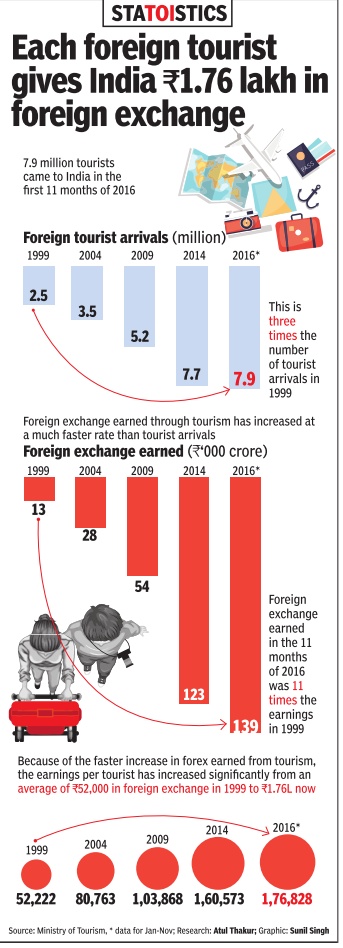
See graphic
Foreign tourists spend more per-capita and stay longer
India draws tourists with deep pockets
Ranks 41st in number of tourists received but 1st in per-capita spend by them
Ruchika Chitravanshi | New Delhi
business-standard February 17, 2014
India is not on top in numbers of foreign tourist arrivals but the average amount of money spent by international travellers here, on a per-capita basis, is more than anywhere else. Also, according to the United Nations World Tourism Organization (UNWTO) data, though the country is ranked 41st in terms of inbound tourist arrivals, it is 16th in total tourism receipts.
Major tourist destinations like the US, China, the United Kingdom and France see far higher annual foreign tourist arrivals, but their per-capita receipts from inbound foreign travellers is much lower than India. According to experts, this is mainly because of a large number of business visitors to India and longer duration of their stay.
Data from the tourism ministry and UNWTO show international tourists' per-capita spend in India as at the end of 2012 stood at over $2,600, while it was $1,900 in the US, $900 in China and $646 in France.
The difference in India's ratings for number of tourist arrivals and total receipts suggests that the country has been able to draw high-spending travellers. In 2013, it managed to earn $18 billion foreign exchange with only 6.8 million foreign tourists. Comparable 2013 figures for other countries are not yet available.
Other key tourist destinations like the US and China are ranked higher on both parameters. While the US was first in total receipts in 2012 ($126.2 billion), it was ranked second in the number of tourists visiting the country. China, which earned $50 billion from tourists in the year and was ranked fourth, stood third in annual foreign tourist arrivals. France, which received the highest number of foreign travellers (83 million in 2012), has been third in tourism receipts for the past three years.
The share of business travellers in inbound tourism has gone up from 15 per cent in 2009 to 23 per cent in 2012. Globally, during the year, 52 per cent of inbound tourists were for leisure and 14 per cent for business. In India, on the other hand, 27 per cent came for leisure, while 23 per cent travelled for business, according to tourism ministry data.
Besides, India also gets the advantage of being a longer-leisure destination. The average duration of stay for a foreign tourist in India is one week to a fortnight. Given a wide variety of tourist destinations the country offers, several European and American tourists stretch their stay even beyond a month. "We are not a country that a tourist just thinks of, packs a bag and lands. It is not an impulse spot; one needs to plan much in advance. This is why we are not a weekend destination like many of our neighbouring countries," says a spokesperson for Cox & Kings.
Over the past decade, India's rank in total earnings from foreign travellers has risen 20 notches - from 36 in 2000 to 16 in 2012. A depreciation in the value of the rupee has also made India an attractive option for foreign tourists. Besides, in spite of an economic slowdown, the rate of growth in tourist earnings has been higher than the global average. For instance, in 2012 when world tourism receipts grew by 3.2 per cent, India's earnings went up by seven per cent.
The country received the highest numbers tourists from the US, while Chinese nationals were the 12th-largest in terms of number of visitors.
2012-14
The Times of India, Mar 22 2016
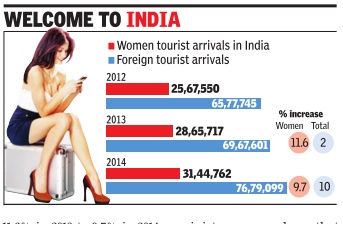
Himanshi Dhawan
After the Nirbhaya gang rape in December 2012, India's dubious distinction of being unsafe for women got even more strengthened. Industry leaders spoke about women tourists from overseas shying away from the country. However, its impact on tourism can only be gauged now, with government data revealing how growth in women tourist arrivals dropped from 11.6% in 2013 to 9.7% in 2014.This may not appear to be a sharp slide, but it will be useful to note that the total foreign tourist arrivals increased by 10.2% in 2014 as compared to 2% in 2013.
Data from the tourism ministry reveals that 25,67,550 women tourists arrived in India in 2012. This increased to 28,65,717 in 2013 (an increase of 11.6%) and 31,44,762 in 2014 (registering a lower 9.7% increase). At the same time, foreign tourist ar rivals increased from 65,77,745 in 2012 to 69,67,601in 2013 (a mere 2%) to 76,79,099 in 2014 (10.2%). The ministry has also found that the country's number one attraction, the Taj Mahal, is losing its sheen. The number of foreign tourist arrivals to the monument has been steadily dropping, from 7,42,256 in 2012 to 6,95,702 in 2013 and 6,48,511 in 2014. This amounts to a 12.6% decline between 2012 and 2014.
According to the National Crime Records Bureau (NCRB), 384 cases of crime against women tourists from overseas were registered in 2014. Of these, the maximum number of cases were registered in Delhi (135), followed by Goa (66) and Uttar Pradesh (64). NCRB data for pre vious years is not available.The ministry has in recent months introduced some measures to counter the impression that the country is dangerous for women travellers. This includes a 24hour multi-lingual helpline and deployment of tourist police at popular destinations.
The helpline is available in 10 international languages, including Arabic, French, Japanese, Russian and Spanish. The ministry has also issued guidelines to states to devise measures to better protect tourists.
In addition, the ministry has also popularised some tips for travellers, which include taking a picture of a taxi's number plate before boarding it.
E-visa
1,040% growth in 2015
The Times of India, Jan 15 2016
E-visa a hit: 1,040% jump in tourist inflow
Over 4.45 lakh tourists arrived in India in 2015 through the online visa scheme registering a growth of 1040.4%. The highest number of tourists came from the UK followed by the United States and Russia. Though the growth figures are high, tourists using online facilities are still a small fraction of the total foreign tourist arrivals. India attracted about 70 lakh tourists in 2015 at a growth of 4.5%. During December, 2015, a total of 1,03,617 tourists arrived on e-tourist visa as compared to 14,083 during December, 2014, registering a growth of 635.8%.
Between January-December, 2015 a total of 4,45,300 tourist arrived as compared to 39,046 during January-December, 2014 registering a growth of 1040.4%, according to tourism ministry data.The facility for applying for visas online was started in November 2014.
“This high growth may be attributed to introduction of e-tourist visa for 113 countries... the ministry said in a statement.
One of the immediate impact of the decision has been that India has moved 13 positions ahead -from 65th to 52nd rank -in the Tourism and Travel Competitive Index as per the World Economic Forum report.
According to tourism ministry data 23.81% of tourists came from the UK, 19.59% from the US, followed by Russia (9.33%), Australia (5.44%) and Germany (4.86%). Other countries include France (4.44%), Canada (4.40%), China (3.10%), Republic of Korea (1.83%) and Ukraine (1.67%).
The maximum number of arrivals were predictably at New Delhi airport where 36.23% of the foreign tourists landed. This was followed by Mumbai airport (21.90%), Goa airport (16.54%), Bengaluru airport (5.54%) and Kochi airport (4.68%). Other airports that drew foreign travellers included Chennai (4.21%), Kolkata (2.74%), Hyderabad (2.68%), Trivandrum (2.05%) and Ahmedabad (1.79%).
There were initial teething problems with the online visa facility , initially called “visa-on-arrival“.
Many tourists landed in the country only to be turned back for inadequate documentation. Inundated by complaints, the ministry changed the nomenclature to e-tourist visa. Starting with 40 countries the facility has now bee extended to 113 countries. The tourism ministry now plans to extend it for medical visas as well.
Top entry points for foreign tourists
The Times of India, January 29, 2016
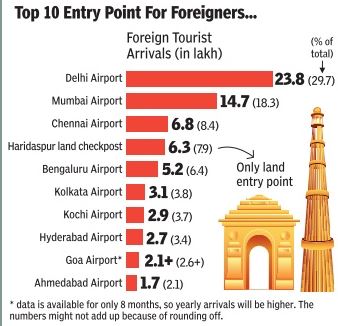
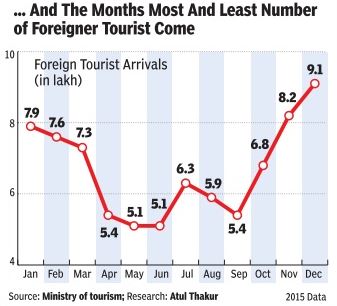
Delhi airport leads airports across the country in terms of foreign tourist arrivals. This might be linked to the fact that Delhi-Agra-Rajasthan is perhaps the most popular tourist destination among visitors from abroad. The national capital is followed by Mumbai, India's financial capital, and Chennai. Interestingly, the fourth highest tourist arrivals have been recorded at the Haridaspur land checkpost on the India-Bangladesh border.
The number of tourists
2015
TN, Maharashtra, UP, Delhi top 4
The Times of India, Jul 01 2016
Himanshi Dhawan Tamil Nadu has topped the popularity charts for both domestic and foreign tourists for the second year in a row, beating Maharashtra and other favoured destinations like Goa and Kerala. TN received 4.68 million foreign tourists in 2015, a tad higher than 4.66 million in 2014. Domestically , it continued its winning streak since 2013 with 333.5 million Indians visiting in 2015, according to tourism ministry data. Tamil Nadu's rise as a top-ranker for Indian and foreign travellers is surprising and could possibly be attributed to Indians working and studying abroad and non-resident Indians coming to visit family and relatives,“ an industry source said.
Maharashtra came second with 4.41 million foreign tourists, thanks mainly to Mumbai's busy airport that acts as a gateway for India. Uttar Pradesh, with the famous Taj Mahal, attracted 3.1 million tourists and is in the third place while Delhi with 2.38 million foreign tourists came in fourth.
Others states that are in the top 10 included West Bengal (1.49 million), Rajasthan (1.48 million), Kerala (0.98 million), Bihar (0.92 million), Karnataka (0.64 million) and Goa (0.54 million).Goa returned to the top 10 after a year's gap.
The contribution of top 10 states was about 88.4% to the total number of foreign tourist visits in the country during 2015.
Domestic tourists by far overshadowed foreign tour ists' flow with 1432 million tourists in 2015 as compared to 1282 million in 2014, registering a growth of 11.63%.
Besides Tamil Nadu, the top 10 states that Indians travelled to include Uttar Pradesh, Andhra Pradesh, Karnataka, Maharashtra and Telangana.
Travel and Tourism Competitiveness Index
2017: India rises 12 ranks to 40
`Swachh' India up 12 notches on travel competitive index, May 4, 2017: The Times of India
India rises in UN's tourism rankings, May 19, 2017: The Times of India
India is among the 15 most-improved countries on the global index and has moved up 12 notches from 52 in 2015 to 40 in 2017.Spain remains on top of the index, while Yemen brings up the rear ranked 136.
2017: India rises from 40 ranks to 24
In a boost to India's efforts to increase tourist inflow into the country, the UN World Tourism Organisation's (UNWTO) report showed that India had improved its ranking on the World Tourism Barometer to 24, up from its previous best of 40 in 2015. According to UNWTO, international tourist arrivals (ITAs) have two components -foreign tourist arrivals (FTAs) and non-resident national arrivals. On the World Tourism Barometer, UNWTO ranks countries on the basis on their ITAs. India had so far only compiled FTA figures. This year, though, the tourism ministry has started compiling data of arrivals of NRIs. A ministry release said, “Due to this inclusion, India's improved rank reflecting the true and comparable scenario has now been acknowledged by the UNWTO.“
